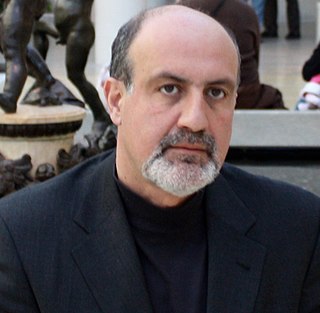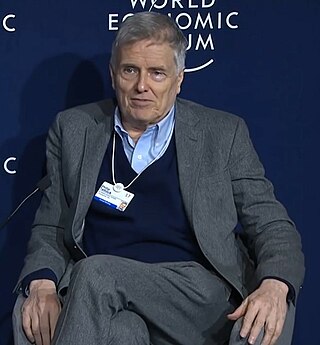Related Research Articles
Forecasting is the process of making predictions based on past and present data. Later these can be compared with what actually happens. For example, a company might estimate their revenue in the next year, then compare it against the actual results creating a variance actual analysis. Prediction is a similar but more general term. Forecasting might refer to specific formal statistical methods employing time series, cross-sectional or longitudinal data, or alternatively to less formal judgmental methods or the process of prediction and assessment of its accuracy. Usage can vary between areas of application: for example, in hydrology the terms "forecast" and "forecasting" are sometimes reserved for estimates of values at certain specific future times, while the term "prediction" is used for more general estimates, such as the number of times floods will occur over a long period.

Nassim Nicholas Taleb is a Lebanese-American essayist, mathematical statistician, former option trader, risk analyst, and aphorist. His work concerns problems of randomness, probability, complexity, and uncertainty.
The mean absolute percentage error (MAPE), also known as mean absolute percentage deviation (MAPD), is a measure of prediction accuracy of a forecasting method in statistics. It usually expresses the accuracy as a ratio defined by the formula:
Dipak Chand Jain is Co-President and Global Advisor of China Europe International Business School. He previously was the Director (Dean) of Sasin Graduate Institute of Business Administration of Chulalongkorn University in Bangkok, Thailand. The announcement of his appointment as Director of Sasin was made on 7 June 2014. He stepped down in 2017.
Philip M. Parker is an American economist and academic, currently the INSEAD Chaired Professor of Management Science at INSEAD in Fontainebleau, France. He has patented a method to automatically produce a set of similar books from a template that is filled with data from databases and Internet searches. He claims that his programs have written more than 200,000 books.
John Scott Armstrong was an author, forecasting and marketing expert, and an Emeritus Professor of Marketing at the Wharton School of the University of Pennsylvania. Armstrong's research and writing in forecasting promote the ideas that in order to maximize accuracy, forecasting methods should rely on evidence-based methods.
The PollyVote project uses the high-profile application of predicting U.S. presidential election results to demonstrate advances in forecasting research. The project is run by political science professors and forecasting experts, one of which is J. Scott Armstrong. All procedures, data, and results are fully disclosed and freely available online.

Philip E. Tetlock is a Canadian-American political science writer, and is currently the Annenberg University Professor at the University of Pennsylvania, where he is cross-appointed at the Wharton School and the School of Arts and Sciences. He was elected a Member of the American Philosophical Society in 2019.
Robin John Hyndman is an Australian statistician known for his work on forecasting and time series. He is a Professor of Statistics at Monash University and was Editor-in-Chief of the International Journal of Forecasting from 2005–2018. In 2007, he won the Moran Medal from the Australian Academy of Science for his contributions to statistical research. In 2021, he won the Pitman Medal from the Statistical Society of Australia.
A consensus forecast is a prediction of the future created by combining several separate forecasts which have often been created using different methodologies. They are used in a number of sciences, ranging from econometrics to meteorology, and are also known as combining forecasts, forecast averaging or model averaging and committee machines, ensemble averaging or expert aggregation.
In statistics, the mean absolute scaled error (MASE) is a measure of the accuracy of forecasts. It is the mean absolute error of the forecast values, divided by the mean absolute error of the in-sample one-step naive forecast. It was proposed in 2005 by statistician Rob J. Hyndman and Professor of Decision Sciences Anne B. Koehler, who described it as a "generally applicable measurement of forecast accuracy without the problems seen in the other measurements." The mean absolute scaled error has favorable properties when compared to other methods for calculating forecast errors, such as root-mean-square-deviation, and is therefore recommended for determining comparative accuracy of forecasts.
John Galt Solutions is a software company that provides forecasting and supply chain management software.
The Greenbook of the Federal Reserve Board of Governors is a book with projections of various economic indicators for the economy of the United States produced by the Federal Reserve Board before each meeting of the Federal Open Market Committee. The projections are referred to as Greenbook projections or Greenbook forecasts. Many of the variables projected coincide with variables covered in the Survey of Professional Forecasters.
The Makridakis Competitions are a series of open competitions to evaluate and compare the accuracy of different time series forecasting methods. They are organized by teams led by forecasting researcher Spyros Makridakis and were first held in 1982.
Quantile Regression Averaging (QRA) is a forecast combination approach to the computation of prediction intervals. It involves applying quantile regression to the point forecasts of a small number of individual forecasting models or experts. It has been introduced in 2014 by Jakub Nowotarski and Rafał Weron and originally used for probabilistic forecasting of electricity prices and loads. Despite its simplicity it has been found to perform extremely well in practice - the top two performing teams in the price track of the Global Energy Forecasting Competition (GEFCom2014) used variants of QRA.
Electricity price forecasting (EPF) is a branch of energy forecasting which focuses on using mathematical, statistical and machine learning models to predict electricity prices in the future. Over the last 30 years electricity price forecasts have become a fundamental input to energy companies’ decision-making mechanisms at the corporate level.
CEDEP, also known as The European Centre for Executive Development, is an international, not-for-profit organization co-located on the INSEAD campus in Fontainebleau, France, about 50 km from Paris. Founded in 1972, it operates as an executive club and corporate university for a diverse set of 20 global companies including L’Oréal, Aviva, Renault, Bekaert, Valeo, AXA, GDF Suez, and TATA Steel. CEDEP offers two types of programs: Open Enrollment, available to managers from all member companies, and Company Specific programs. Most programs are delivered on CEDEP's purpose-built, residential campus, but in recent years CEDEP has been delivering programs off-campus, notably in China, Brazil, and Canada.
The Hellenic Operational Research Society (HELORS) is the official non-profit society for the scientific field of Operations Research in Greece. The society is a member of the European umbrella organization, the Association of European Operational Research Societies, and of the International Federation of Operational Research Societies.
A superforecaster is a person who makes forecasts that can be shown by statistical means to have been consistently more accurate than the general public or experts. Superforecasters sometimes use modern analytical and statistical methodologies to augment estimates of base rates of events; research finds that such forecasters are typically more accurate than experts in the field who do not use analytical and statistical techniques, though this has been overstated in some sources. The term "superforecaster" is a trademark of Good Judgment Inc.
Robin Miles Hogarth was a British-American psychologist and emeritus professor in the Department of Economics and Business at Universitat Pompeu Fabra in Barcelona, Spain. He served as president of both the Society for Judgment and Decision Making and the European Association for Decision Making. His previous positions include ICREA Research Professor at Universitat Pompeu Fabra and Wallace W. Booth Professor of Behavioral Science at the University of Chicago.
References
- 1 2 3 "Spyros Makridakis". INSEAD . Retrieved April 19, 2014.
- 1 2 "Spyros G. Makridakis". Amazon. Retrieved April 19, 2014.
- 1 2 3 Makridakis, Spyros; Hibon, Michele (October–December 2000). "The M-3 Competition: results, conclusions, and implications" (PDF). International Journal of Forecasting . 16 (4): 451–476. doi:10.1016/S0169-2070(00)00057-1. S2CID 14583743 . Retrieved April 19, 2014.
- 1 2 Koning, Alex J.; Frances, Philip Hans; Hibon, Michele; Stekler, H. O. (July–September 2005). "The M3 competition: Statistical tests of the results". International Journal of Forecasting . 21 (3): 397–409. doi:10.1016/j.ijforecast.2004.10.003.
- 1 2 Hyndman, Rob J.; Koehler, Anne B. (October–December 2006). "Another look at measures of forecast accuracy". International Journal of Forecasting . 22 (4): 679–688. CiteSeerX 10.1.1.154.9771 . doi:10.1016/j.ijforecast.2006.03.001. S2CID 15947215 . Retrieved April 19, 2014.
- 1 2 "M3-competition (full data)". International Institute of Forecasters. 12 February 2012. Retrieved April 19, 2014.
- ↑ "Spyros Makridakis". Olympedia. Retrieved 4 June 2020.
- ↑ Makridakis, Spyros; Hibon, Michele (1979). "Accuracy of forecasting: an empirical investigation (with discussion)". A 142. Journal of the Royal Statistical Society: 97–145.
{{cite journal}}: Cite journal requires|journal=(help) - ↑ Spyros Makridakis; et al. (April–June 1982). "The accuracy of extrapolation (time series) methods: results of a forecasting competition". Journal of Forecasting. 1 (2): 111–153. doi:10.1002/for.3980010202. S2CID 154413915.
- ↑ Newbold, Paul (1983). "The competition to end all competitions". 2. Journal of Forecasting: 276–279.
{{cite journal}}: Cite journal requires|journal=(help) - ↑ Spyros Makridakis; et al. (April 1993). "The M-2 Competition: a real-time judgmentally based forecasting study". International Journal of Forecasting. 9: 5–22. doi:10.1016/0169-2070(93)90044-N.
- ↑ "Past Editors". International Institute of Forecasters, International Journal of Forecasting section. Archived from the original on 2011-02-10.
- ↑ "Randomness Activists". September 11, 2009. Retrieved April 19, 2014.
- ↑ Makridakis, Spyros; Hogarth, Robin M.; Gaba, Anil (January 1, 2010). "Why Forecasts Fail. What to Do Instead". MIT Sloan Management Review . Retrieved April 19, 2014.